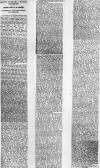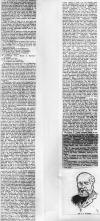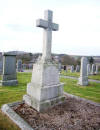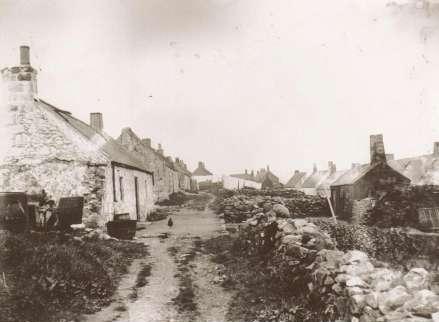
George J Walker |
A local tribute to George J. Walker - 1898. Page 1.
A local tribute to George J. Walker - 1898. Page 2.
George James Walker, the eldest son of Robert Walker was born in December 1837. He inherited many of his father’s characteristics and qualities and, over his lifetime, probably even surpassed his father in terms of popularity with the local populace around Portlethen. He also inherited his father’s business acumen and followed in his footsteps in respect to land valuation, farming, breeding and showing cattle. Like generations of the Walker family before him he continued to live in the Portlethen area, on his farm houses at Mains of Portlethen or Hillside House.
 George
J Walker succeeded his father as a land valuator and with his qualities
of industry, perseverance, honesty, integrity, a conciliatory
disposition, easiness of access, and above all else, sound common sense,
his firm of Walker and Duncan, who were renowned as engineers, surveyors
and architects became very large, prosperous and well known throughout
the north of Scotland.
George
J Walker succeeded his father as a land valuator and with his qualities
of industry, perseverance, honesty, integrity, a conciliatory
disposition, easiness of access, and above all else, sound common sense,
his firm of Walker and Duncan, who were renowned as engineers, surveyors
and architects became very large, prosperous and well known throughout
the north of Scotland.
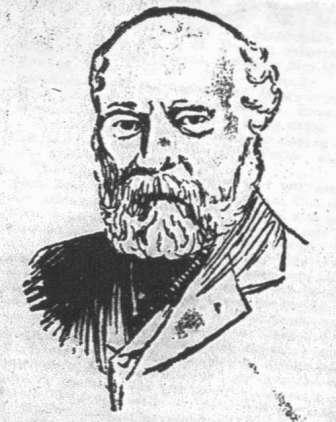 Mr Walker’s services as factor were much valued, his
factorial appointments including the Earl of Aberdeen’s Cromar estates,
the Ballogie, Midstrath, and Balnacraig estate, and the Techmuiry
estate, all in Aberdeenshire; Berryhill, Newtonhill, Gillybrands, Findon,
Netherley and Fawsyde estates in Kincardineshire, and at one time the
Balnespick and Clune estates in Inverness-shire. He was also land
adviser to the Governors of Robert Gordon’s College and the Aberdeen
Educational Trust, and his firm of Walker and Duncan had extensive
experience of the valuing of estates and farms all over Scotland.
Mr Walker’s services as factor were much valued, his
factorial appointments including the Earl of Aberdeen’s Cromar estates,
the Ballogie, Midstrath, and Balnacraig estate, and the Techmuiry
estate, all in Aberdeenshire; Berryhill, Newtonhill, Gillybrands, Findon,
Netherley and Fawsyde estates in Kincardineshire, and at one time the
Balnespick and Clune estates in Inverness-shire. He was also land
adviser to the Governors of Robert Gordon’s College and the Aberdeen
Educational Trust, and his firm of Walker and Duncan had extensive
experience of the valuing of estates and farms all over Scotland.
As an agriculturist Mr. Walker was well known in farming circles throughout Scotland, much of that fame due to his connection to the Portlethen herd of Aberdeen Angus cattle and his knowledge of this breed caused his services to be in much demand as a judge around a variety of cattle shows and fairs around the country, including the Highland Society’s Show at Edinburgh in 1893.
When the Volunteer movement was in its infancy Mr Walker took the initiative, along with his father Robert and Captain Ross of Netherley, in the formation of the Portlethen Company of Volunteers, of which he was for some time captain. Walker was a crack shot with the rifle, and brought great credit to both the company and himself by winning the Queen’s Cup at the Aberdeen Wapinschaw in 1871. In addition to local competitions Walker also represented Scotland in international competition in the 1860’s and he commanded the first volunteer camp in Scotland on the Hill of Clochandighter in June 1869.
George J. Walker proved to be a wonderful benefactor to the people of the parish of Banchory Devenick, and particularly in respect to the welfare of the parishioners of the Portlethen district he took a deep and active interest.
He was chairman of the Parish Council, a member of the School Board, a member of the Church of Scotland, and an elder of the Kirk at Portlethen. As well as this he was a generous friend and helper of the congregation and his gifts included communion vessels in 1886, a harmonium in 1889, a new roadway to the church in 1897 and a pipe organ in 1898. Additionally Mr Walker was also responsible for the design of the Jubilee Hall, the foundation stone of which was laid in 1889.
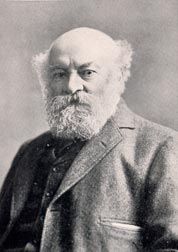 His interest in the parish and his great services on its
behalf were publicly recognised in 1898, when he was presented with an
address from the people of Portlethen that was held at the
Jubilee Hall.
The fact that there were over 800 subscribers, strictly confined to the
parish, gives some indication of the popularity of a presentation. It
was originally intended that Mr Walker should be presented with a
portrait, painted by an eminent artist, but Walker, having heard that
such a movement was afoot, gave it to be understood that he would be
gratified with a simple expression of goodwill on the part of his
friends.
His interest in the parish and his great services on its
behalf were publicly recognised in 1898, when he was presented with an
address from the people of Portlethen that was held at the
Jubilee Hall.
The fact that there were over 800 subscribers, strictly confined to the
parish, gives some indication of the popularity of a presentation. It
was originally intended that Mr Walker should be presented with a
portrait, painted by an eminent artist, but Walker, having heard that
such a movement was afoot, gave it to be understood that he would be
gratified with a simple expression of goodwill on the part of his
friends.
Attached are copies of the actual address that was given in March 1898 and was reported in the local press. This address sums up the depth of feeling and the respect held for George J Walker by the people of Portlethen.
Walker died in February 1914 and his funeral at Portlethen church was attended by upwards of 700 people.
The resting place of George J. Walker at Portlethen Kirkyard.
